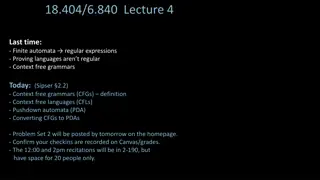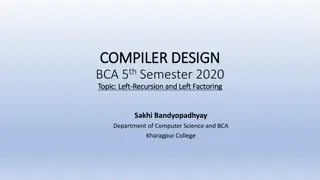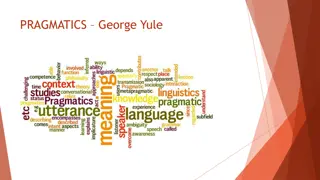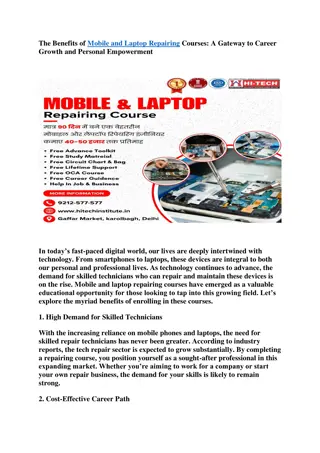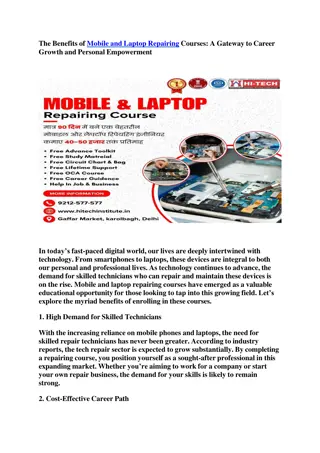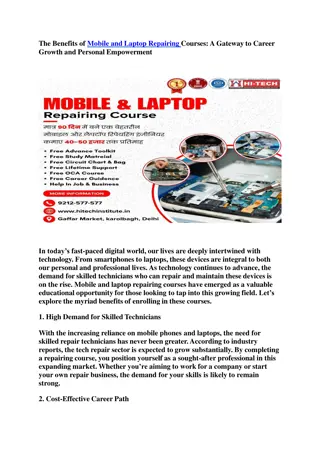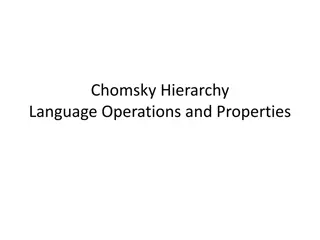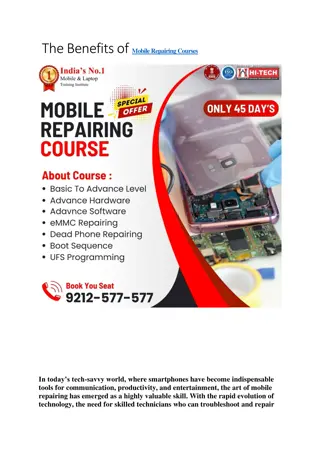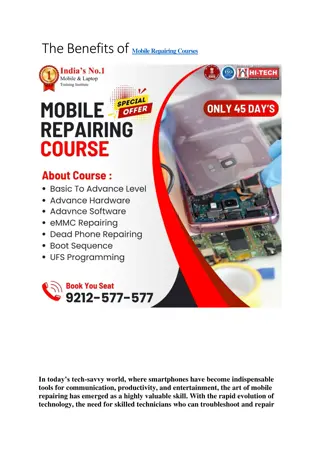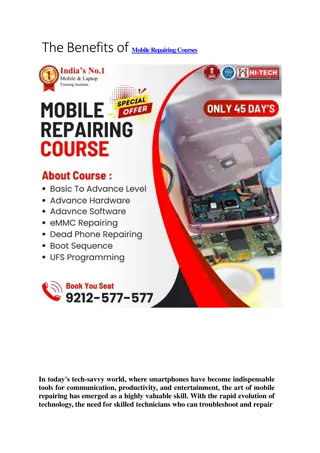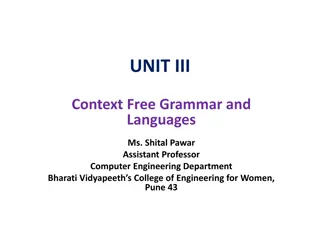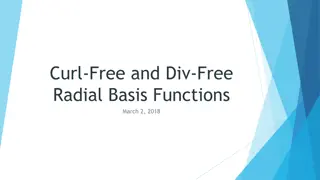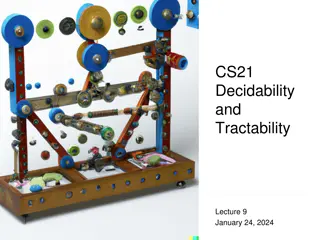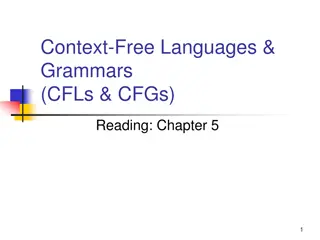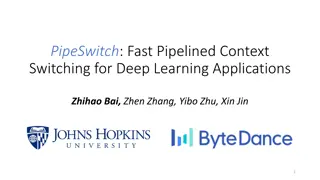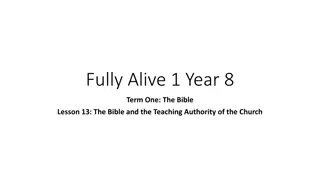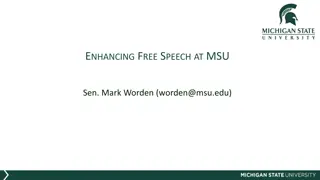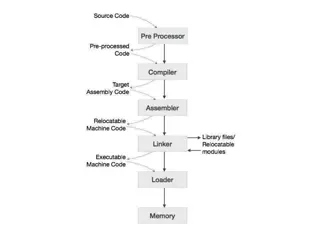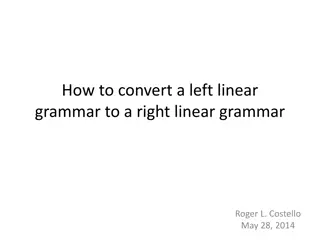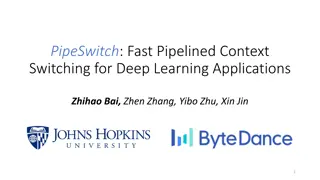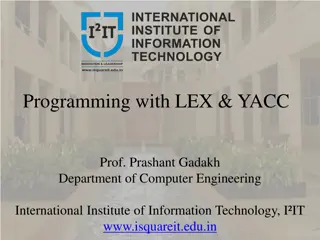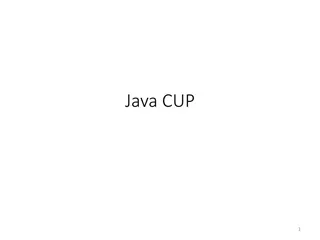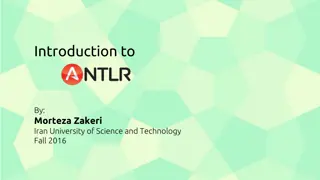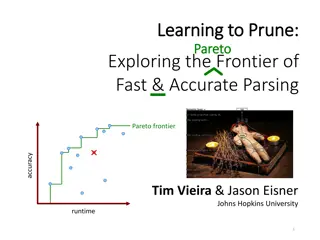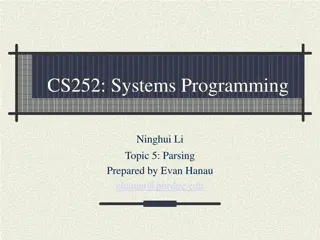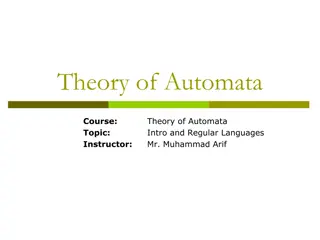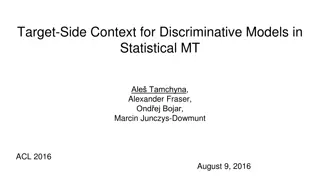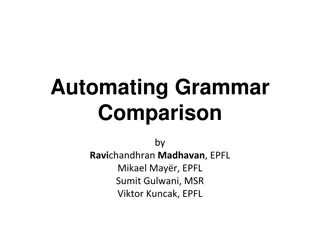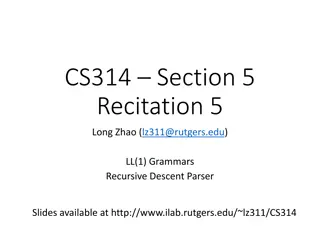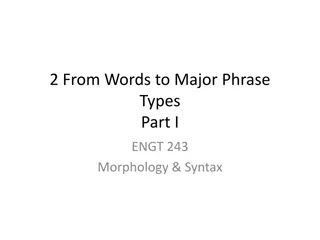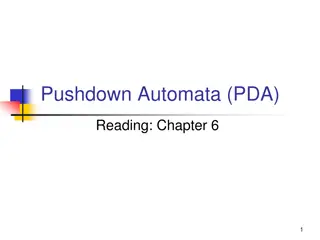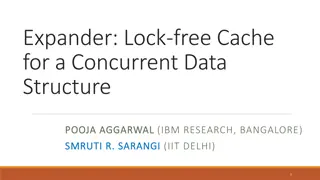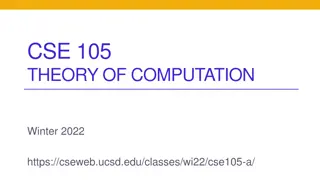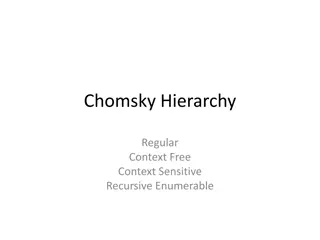Understanding Formal Languages and Automata Theory
This course delves into abstract models of computers and computation, offering essential concepts and principles for understanding the fundamental nature of the computer field. Exploring topics such as regular expressions, context-free grammars, and automata theory, students gain insights into the p
4 views • 11 slides
Understanding Context-Free Grammars (CFGs) and Pushdown Automata
Exploring Context-Free Grammars (CFGs) and Pushdown Automata, covering definitions, examples, ambiguity, and conversions. Learn about generating strings, CFG formal definitions, ambiguity in grammars, and more. Connect with the basics of context-free languages and their relations to PDAs. Dive into
0 views • 13 slides
Understanding Left Recursion and Left Factoring in Compiler Design
Left recursion and left factoring are key concepts in compiler design to optimize parsing. Left recursion can be problematic for top-down parsers and needs to be eliminated using specific techniques. Left factoring is a method to resolve ambiguity in grammars with common prefixes, making them suitab
0 views • 15 slides
Overview of Pragmatics and Deixis According to George Yule
Pragmatics and Deixis are crucial aspects of language understanding, as explored by George Yule. Pragmatics focuses on the use of language in context, while Deixis involves pointing via language to convey meaning based on the immediate context. Deictic expressions play a significant role in face-to-
0 views • 19 slides
BEST MOBILE AND LAPTOP REPAIRING COURSES
Become the best mobile and laptop repairing engineer in just 90 days and earn 40 to 50 thousand per month!!\nWhy you should join hitech ?\n-free advance toolkit\n-free study material \n-free circuit chart and bag\n-free Oca course \n-free career guid
1 views • 4 slides
BEST MOBILE AND LAPTOP REPAIRING COURSES
Become the best mobile and laptop repairing engineer in just 90 days and earn 40 to 50 thousand per month!!\nWhy you should join hitech ?\n-free advance toolkit\n-free study material \n-free circuit chart and bag\n-free Oca course \n-free career guid
0 views • 4 slides
BEST MOBILE AND LAPTOP REPAIRING COURSES
Become the best mobile and laptop repairing engineer in just 90 days and earn 40 to 50 thousand per month!!\nWhy you should join hitech ?\n-free advance toolkit\n-free study material \n-free circuit chart and bag\n-free Oca course \n-free career guid
1 views • 4 slides
BEST MOBILE AND LAPTOP REPAIRING COURSES
Become the best mobile and laptop repairing engineer in just 90 days and earn 40 to 50 thousand per month!!\nWhy you should join hitech ?\n-free advance toolkit\n-free study material \n-free circuit chart and bag\n-free Oca course \n-free career guid
1 views • 4 slides
Understanding Chomsky Hierarchy in Language Theory
Explore Chomsky Hierarchy in language theory, including different types of languages, grammars, and automata. Learn how to prove if a language is regular, context-free, recursive, or recursively enumerable. Understand the closure properties of regular, context-free, recursive, and recursively enumer
2 views • 10 slides
ADVANCED MOBILE REPAIRING INSTITUTE
Become the best mobile repairing engineer in just 90 days and earn 40 to 50 thousand per month!!\nWhy you should join hitech ?\n-free advance toolkit\n-free study material \n-free circuit chart and bag\n-free Oca course \n-free career guidance \n-hel
0 views • 4 slides
ADVANCED MOBILE REPAIRING INSTITUTE
Become the best mobile repairing engineer in just 90 days and earn 40 to 50 thousand per month!!\nWhy you should join hitech ?\n-free advance toolkit\n-free study material \n-free circuit chart and bag\n-free Oca course \n-free career guidance \n-hel
0 views • 4 slides
MOBILE REPAIRING INSTITUTE
Become the best mobile repairing engineer in just 90 days and earn 40 to 50 thousand per month!!\nWhy you should join hitech ?\n-free advance toolkit\n-free study material \n-free circuit chart and bag\n-free Oca course \n-free career guidance \n-hel
0 views • 4 slides
Context-Free Grammars: Examples and Construction
Context-free grammars (CFG) are formal grammars used to generate patterns in a given language. This content provides examples of constructing CFGs for different languages, showcasing the process with detailed explanations and visuals.
0 views • 122 slides
Overview of Grammar Types and Chomsky Hierarchy
The four types of grammars are General, Context-Sensitive, Context-Free, and Linear grammars, each recognizing a specific set of languages. Chomsky Hierarchy categorizes these grammars into four levels, indicating subsets of languages they can recognize. Context-free grammars have specific productio
0 views • 17 slides
Understanding Curl-Free and Div-Free Radial Basis Functions in Physical Situations
This content explores the applications of Curl-Free and Div-Free Radial Basis Functions in solving partial differential equations for fields, the theoretical soundness of using RBFs, and examples illustrating divergence-free interpolation. It also delves into matrix-valued RBF formulations, converge
4 views • 13 slides
Understanding Decidability and Tractability in CS21 Lecture
Explore the concepts of decidability and tractability in the CS21 lecture on January 24, 2024. The lecture covers topics such as converting context-free grammars into Chomsky Normal Form, algorithms for determining language generation, worst-case running times, dynamic programming strategies, and de
3 views • 31 slides
Understanding Context-Free Languages and Grammars
Context-Free Languages and Grammars (CFLs & CFGs) are essential in theoretical computer science, providing a framework for recognizing non-regular languages. This content explores the distinction between regular and context-free languages, delves into the construction of language recognizers using c
0 views • 40 slides
PipeSwitch: Fast Context Switching for Deep Learning Applications
PipeSwitch introduces fast pipelined context switching for deep learning applications, aiming to enable GPU-efficient multiplexing of multiple DL tasks with fine-grained time-sharing. The goal is to achieve millisecond-scale context switching overhead and high throughput, addressing the challenges o
1 views • 38 slides
Understanding the Context of Bible Stories and Church Teachings
Explore the importance of context in understanding Bible stories and church teachings, including discussions on Magisterium, Sacred Tradition, and the role of the Church in interpreting scripture. Learn how context enhances our comprehension of religious texts and traditions. Delve into examples hig
0 views • 13 slides
Ensuring Free Speech Rights at Michigan State University
Michigan State University's Trustees emphasize the importance of protecting free speech on campus. The university's philosophy supports campus dissent, promoting a healthy exchange of ideas. Recent incidents, like protesters disrupting a speaker's event, raise concerns about safeguarding free speech
0 views • 11 slides
Understanding Issues in Context-Free Grammar: Ambiguity, Precedence, Associativity, and More
Delve into the complexities of context-free grammar, exploring concepts such as ambiguity, precedence, associativity, left recursion, and left factoring. Learn about the challenges posed by left recursion and the differences between ambiguous and unambiguous, as well as deterministic and non-determi
0 views • 7 slides
Converting Left Linear Grammar to Right Linear Grammar
Learn about linear grammars, left linear grammars, and right linear grammars. Discover why left linear grammars are considered complex and how right linear grammars offer a simpler solution. Explore the process of converting a left linear grammar to a right linear grammar using a specific algorithm.
0 views • 44 slides
Efficient Context Switching for Deep Learning Applications Using PipeSwitch
PipeSwitch is a solution that enables fast and efficient context switching for deep learning applications, aiming to multiplex multiple DL apps on GPUs with minimal latency. It addresses the challenges of low GPU cluster utilization, high context switching overhead, and drawbacks of existing solutio
0 views • 46 slides
Introduction to Lex and Yacc: Compiler Design Essentials
Lex and Yacc are essential tools in compiler design. Lex serves as a lexical analyzer, converting source code to tokens, while Yacc is a parser generator that implements parsing based on BNF grammars. Through these tools, strings are processed, and code is generated for efficient compilation. This i
0 views • 10 slides
Understanding Java CUP Parser Generators
Explore the world of Java CUP parser generators, focusing on creating Abstract Syntax Trees (ASTs), translating lists in context-free grammar, and the use of parser tools like YACC and Java CUP. Dive into creating grammars, token classes, and AST classes to build parsers effectively.
0 views • 15 slides
Automata Theory and Theory of Computation Overview
This course overview covers concepts in automata theory and theory of computation, including formal language classes, grammars, recognizers, theorems in automata theory, decidability, and intractability of computational problems. The Chomsky hierarchy, interplay between computing components, modern-
0 views • 42 slides
Understanding Top-Down Parsing in Context-Free Syntax
Context-free syntax expressed with context-free grammar plays a key role in top-down parsing. This parsing method involves constructing parse trees from the root down to match an input string by selecting the right productions guided by the input. Recursive-descent parsing, Rule Sentential Forms, an
0 views • 17 slides
Introduction to ANTLR: A Brief Overview
ANTLR (Another Tool For Language Recognition) is a parser generator that uses LL(*) for parsing input grammars. It generates source code in Java, C#, JavaScript, Python2, and Python3 to create language recognizers. Learn about LL(k) and LL(*) grammars, the history of ANTLR, and how it works in this
0 views • 32 slides
Exploring Fast & Accurate Parsing With Learning to Prune
In this informative content, the concept of learning to prune is discussed in the context of exploring the frontier of fast and accurate parsing. It delves into the optimization tradeoff between runtime and accuracy in end-to-end systems, showcasing a Pareto frontier of different system performances
0 views • 42 slides
Understanding Context-Free Grammars in Systems Programming
This insightful content delves into the world of context-free grammars, explaining their significance in parsing computer programming languages. It discusses the hierarchy of language classification, the limitations of regular expressions in expressing certain constructs like palindromes, and the ut
0 views • 31 slides
Theory of Automata: Introduction and Regular Languages Overview
This course delves into the fundamentals of Theory of Automata, exploring topics such as regular languages, finite state models, grammars, Turing machines, and more. Instructor Mr. Muhammad Arif guides students through essential concepts like finite automata, pumping lemma, decidability, and Chomsky
0 views • 95 slides
Importance of Context in Statistical Machine Translation
Understanding the significance of context in machine translation is crucial for improving accuracy and disambiguating word sense. This research delves into the impact of target-side context for discriminative models in statistical machine translation, showcasing how context influences model performa
0 views • 29 slides
Understanding Bottom-Up and Top-Down Parsing in Computer Science
Bottom-up parsing and top-down parsing are two essential strategies in computer science for analyzing and processing programming languages. Bottom-up parsing involves constructing a parse tree starting from the leaves and moving towards the root, while top-down parsing begins at the root and grows t
0 views • 29 slides
Automating Grammar Comparison: Insights and Findings
This presentation delves into automating grammar comparison, showcasing the equivalence of CFGs, generating words in CFGs, and uncovering counter-examples. It explores applications such as online grammar tutoring systems and compatibility of programming language grammars. Motivation, contributions,
0 views • 32 slides
Understanding LL(1) Grammars and Computing First & Follow Sets
Exploring LL(1) grammars and the computation of First and Follow sets for non-terminals. This involves defining FIRST(.) as the set of tokens that appear as the first token in strings derived from a non-terminal and FOLLOW(A) as the terminals that can appear immediately to the right of A in the sent
0 views • 33 slides
Understanding Syntax and Lexical Categories in English Grammar
Syntax is the study of rules in generating grammatical sentences, focusing on building grammars that produce well-formed English sentences. It involves organizing words into categories like nouns, verbs, adjectives, and adverbs to form phrases and clauses. Lexical categories are determined based on
0 views • 33 slides
Understanding Pushdown Automata (PDA) for Context-Free Languages
Pushdown Automata (PDA) is a crucial concept in the theory of computation, specifically for the recognition of context-free languages. PDAs are an extension of nondeterministic finite automata (NFA) with an added stack memory. This summary provides insights into the definition, transition functions,
0 views • 34 slides
Understanding Lock-Free and Wait-Free Algorithms in Concurrent Data Structures
Illustration of lock-free and wait-free algorithms compared to blocking algorithms, with insights on concurrent object execution, blocking vs. non-blocking algorithms, definitions, comparisons between locks, lock-free, and wait-free approaches, and explanations on making algorithms wait-free. Exampl
0 views • 23 slides
Theory of Computation: Winter 2022 Learning Goals and Examples
Exploring the theory of computation in the Winter 2022 CSE 105 course at UCSD, focusing on identifying sets of strings as regular, context-free, or neither. Learning about DFA, NFA, PDA, Turing machines, and computational power. Discovering specific non-context-free languages and exploring closure p
0 views • 24 slides
Exploring Chomsky's Language Hierarchy
Delve into the Chomsky Hierarchy, ranging from Regular Languages to Context-Free and beyond. Learn about Noam Chomsky's remarkable contributions to linguistics, philosophy, and more, as well as the properties and examples of Regular and Context-Free languages.
0 views • 22 slides

